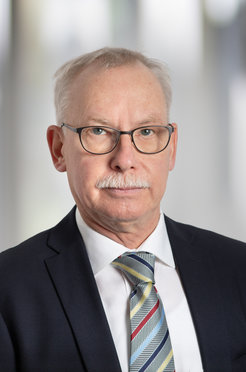Franz-Ulrich Hartl receives the Schleiden Medal
The Leopoldina honors Franz-Ulrich Hartl, Director at the Max Planck Institute of Biochemistry, with the Schleiden Medal for his contributions to the understanding of cellular protein folding.
Martinsried. Franz-Ulrich Hartl, Director at the Max Planck Institute of Biochemistry, is awarded the Schleiden Medal by the German National Academy of Sciences, Leopoldina. The biochemist receives the honor for his work on unraveling the function of molecular chaperones, a class of proteins that help other proteins to fold correctly. Since misfolded proteins are also the cause of neurodegenerative diseases, Hartl's findings help to better understand the development of diseases such as Parkinson's or Alzheimer's diseases. The honor will be awarded on Wednesday, April 19, 2023, in Halle (Saale), Germany.
When proteins are formed in our cells, they are first produced as long chains of amino acids. These amino acid chains must then fold into a unique, three-dimensional structure. Only with their individual and correct structure can our proteins perform their tasks correctly. Prof. Dr. Franz-Ulrich Hartl was able to show that certain "helper molecules", the chaperones, are decisively involved in this folding process. If errors occur during folding, this can lead to neurodegenerative diseases such as Parkinson's or Alzheimer's diseases. Hartl has found that cells use these "helper molecules" to avoid errors during folding. In doing so, chaperones interact with proteins that are still unfolded or have misfolded. They support correct folding and help remove the faulty proteins to prevent disease.
The work of Franz-Ulrich Hartl has contributed significantly to the elucidation of the mechanisms of protein folding in our cells. Misfolding generally plays a crucial role in aging and the development of age-related diseases. Hartl wants to find out why the activity of chaperones decreases with age and how it could be increased again. His research group is also investigating the influence of chaperones on neurodegenerative diseases, such as Huntington's and Parkinson's diseases. His findings provide insights into disease mechanisms, offer opportunities for new therapies, and are important for the biotechnological production of proteins.

About the Laureate
Franz-Ulrich Hartl was born in 1957. He studied Medicine at the University of Heidelberg, where he also obtained his doctoral degree. Hartl joined Walter Neupert’s research group at LMU as a postdoc and then became a group leader in Neupert’s department. A fellowship from the German Research Foundation (DFG) enabled him to undertake research at the University of California, Los Angeles. He did research as a Professor and Howard Hughes Medical Investigator at the Sloan Kettering Institute and at the Cornell University in New York, USA. In 1997, the Max Planck Society succeeded in enticing the renowned scientist back to Germany. Since then, he has been Director and head of the Department of Cellular Biochemistry at the Max Planck Institute of Biochemistry. He has received multiple scientific prizes including 2002 the Gottfried Wilhelm Leibniz Prize, 2011 the Albert Lasker Award for Basic Medical Research, 2012 the Shaw Prize together with Arthur L. Horwich, and 2016 the Albany Medical Center-Prize together with Horwich and Susan Lee Lindquist. In 2018, Hartl was inducted into the Hall of Fame of German Research, in 2019 he received the Dr. Paul Janssen Award and the Paul Ehrlich- and Ludwig Darmstaedter-Prize. In 2020 he was awarded the Breakthrough Prize and in 2022 he received an ERC Advanced Grant to promote his research.
About the National Academy of Sciences: Leopoldina
As the National Academy of Sciences, the Leopoldina provide independent science-based policy advice on socially relevant issues. The Leopoldina represents German science in international bodies, including science-based advice to the annual G7 and G20 summits. It has 1,600 members from more than 30 countries and brings together expertise from almost all research fields. It was founded in 1652 and appointed as the National Academy of Sciences of Germany in 2008. As an independent academy of science, the Leopoldina is committed to the common good. The Schleiden Medal is named after Academy member Matthias Jacob Schleiden (1804-1881). The botanist is a co-founder of the cell theory. The medal has been awarded by the Leopoldina since 1955 for outstanding findings in the field of cell biology.
[tb]












